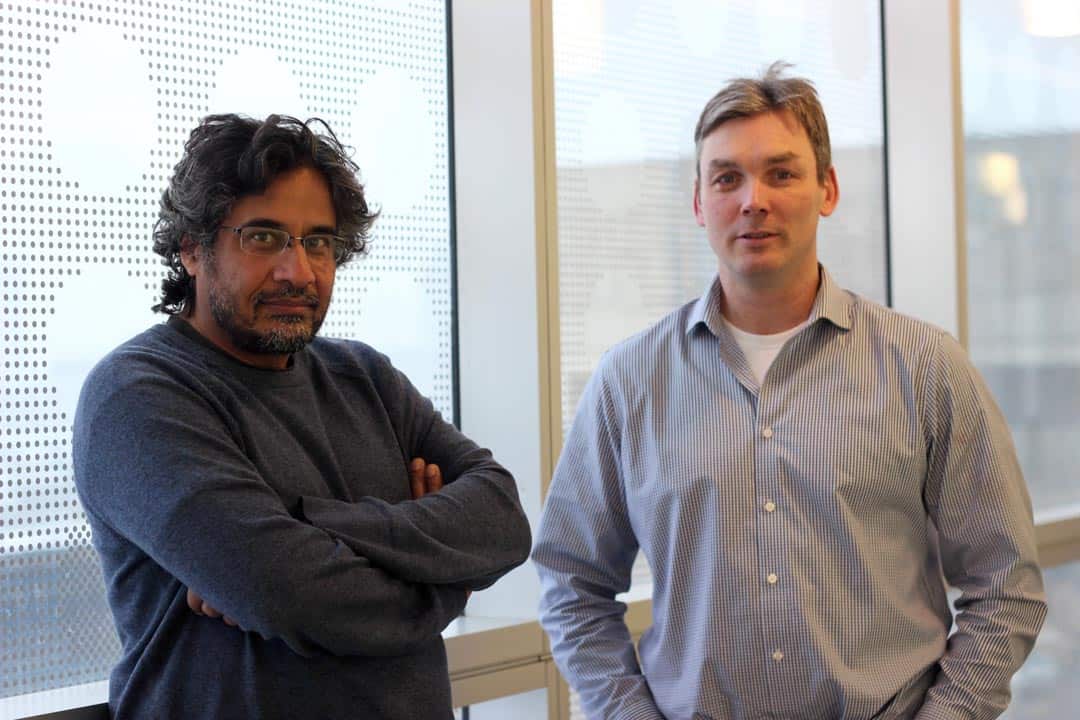A biotech startup co-founded by Sachdev Sidhu, a professor in U of T’s Department of Molecular Genetics, has drawn in $62 million USD following a second round of funding, bringing its total investments to $72 million USD.
Pionyr Immunotherapeutics, which is now planning to take its anti-cancer therapy to clinical trials, initially began as a research collaboration between Sidhu and Max Krummel, a professor at the University of California, San Francisco School of Medicine. Founded in 2015, the California-based startup combined Sidhu’s expertise in antibody phage-display technology with Krummel’s immune system biology research.
This project is a collaborative effort with Toronto Recombinant Antibody Centre (TRAC), which was founded by Sidhu and Dr. Jason Moffat, who is also a Molecular Genetics professor at U of T. Housed in the Donnelly Centre for Cellular and Biomolecular Research, TRAC researchers are working to harness the therapeutic potential of synthetic antibodies.
Synthetic antibodies can be engineered to target a variety of molecules implicated in disease and they are key for drug development. Pionyr’s anti-cancer therapy, known as Myeloid Tuning, uses the high specificity afforded by synthetic antibodies to bolster the immune system’s defence against cancer by manipulating a tumour’s microenvironment.
The immune system uses T cells to detect foreign molecules to evoke a defensive response. Because tumours are created from existing cells in the body, they evade recognition by T cells, dampen the immune response, and proliferate uncontrollably. The key is to restore the body’s immune capacity to fight cancer — this is the premise of immunotherapy in oncology, better known as immuno-oncology.
“So the idea there is simple: you want to turn on a T cell, you simply find proteins that are inhibiting that T cell,” said Sidhu.
Myeloid Tuning achieves this by “alter the tumour microenvironment to favour immune-activating cells over immune-suppressing cells” and enhances anti-tumour defenses. “T cells are activated not by targeting them but by eliminating the inhibitory cell population,” said Sidhu.
Pionyr’s technology could also complement existing anti-tumour therapies like T cell checkpoint inhibitors. Checkpoints are regulators that mediate communication between T cells and the immune system. They are responsible for fine-tuning the body’s immunity and downregulating it when it detects native cells, which would otherwise lead to an autoimmune response. By incorporating checkpoint inhibitors, therapies can be developed to block a tumour’s ability to evade T cell detection.
Ipilimumab, commercially known as Yervoy, set the precedent by becoming the first United States Food and Drug Administration-approved therapeutic antibody against skin cancers and for ushering in a new wave of immuno-oncology. The drug, co-invented by Krummel, inhibits cytotoxic T-lymphocyte-associated protein-4, one of many checkpoints found on T cells. Similarly, pembrolizumab, or Keytruda, inhibits the checkpoint called programmed cell death protein 1 (PD-1).
“Anti-PD-1 binds the T cell and… activates it that way, and then we add another antibody that eliminates inhibitory myeloid cells, so you get double [the effect],” said Sidhu.
Sidhu says there is a critical question in field: does the rest of the tumour simply not have T cells that can attack them or are there additional yet unidentified breaks? These possibilities are not mutually exclusive and are already being investigated. According to Sidhu, the future of immuno-oncology is already here.
Myeloid Tuning is a very promising method, but it is not the only immuno-oncology treatment in the works. Currently, therapeutic agents being researched involve other immune cells like macrophages and natural killer cells that can be exploited for anti-tumour therapies.
“[There is] very little that is not being explored as far as immune cell activation,” said Sidhu. “It’s exciting in that, while only a subset of cancers responds to immunotherapy, the ones that do respond often respond tremendously.”


